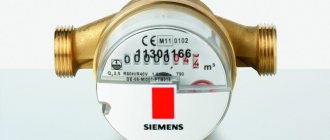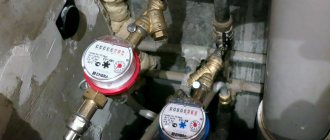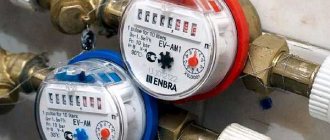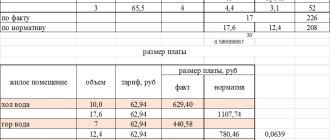Modern man is accustomed to the benefits of civilization, in particular to the fact that water comes out of the tap every day. But a situation may arise when there is a tap, but no water. The hot water was turned off. When will it be turned on? And how long can the water be shut off by law?
The basic regulation governing the relationship between management companies providing service and end clients is the Government Decree “On the provision of utility services to owners and users of premises in apartment buildings and residential buildings” dated May 6, 2011. This Regulation establishes the rules for recalculating payments for poor-quality service.
Normative base
Before calling and finding out the reasons for interruptions in water supply, it is important to familiarize yourself with the current legislation in this area. This needs to be done purely for practical reasons - knowledge of regulatory requirements will help build a conversation with public utilities in a more constructive direction.
The procedure for providing services in the housing and communal services sector is regulated in detail by Decree of the Government of the Russian Federation No. 354, approved on 05/06/2011. The standards for ensuring the safety and normal functioning of hot water systems are enshrined in a special relevant act - SanPiN 2.1.4.2496-09, adopted by the Chief Sanitary Doctor on 04/07/2009.
According to paragraph 4 of Art. 157 of the Housing Code of the Russian Federation, poor-quality service or supply of resources with interruptions that exceed the permissible period entails a reduction in the fee charged for utility services. In this case, the culprit is obliged to transfer a fine to the consumer. The grounds on which you can count on compensation for damage caused are described in Art. 1064 Civil Code. The specifics of liability for failure to fulfill obligations are provided for in Chapter 25 of the Code.
Permissible interruptions in water supply
Metropolitan utility systems are a huge and often not very modernized mechanism that requires regular diagnostics, prevention and repair. All this can serve as a prerequisite for turning off the water. In this case, they turn off either according to the approved schedule or unscheduled.
Regardless of the reasons for the restrictions, the maximum permissible periods of suspension cannot exceed the specified indicators.
| Periodicity | Cold infusion | Hot infusion |
| Total within 1 month | up to 8 o'clock | up to 8 o'clock |
| One time | up to 4 hours | up to 4 hours |
| In an emergency on a dead-end highway | — | up to 24 hours |
| Regularly to prepare for the new heating season | — | Up to 10 days (exclusively in summer) |
Important! During a planned shutdown, the population is notified several weeks, or at most days, before the upcoming events. If an accident or emergency occurs, the population must also be informed about the causes of inconvenience and the expected time frame for their elimination.
Why can water go bad?
There are many reasons why the water in your tap can suddenly change its quality for the worse. Here are just a few of them:
- Repair work. Often, rusty or dirty water comes out of the tap after a planned shutdown of hot water or emergency repairs. If this is observed within a few minutes after opening the tap, it’s okay. If the situation persists for several days, it’s time to complain and demand that it be fixed.
- Poor water purification. The company responsible for supplying water to residential buildings is to blame here. If she skimps on filters or doesn't pay attention to the fact that the equipment breaks down, the quality of the water drops over time.
- Improper maintenance of the plumbing system. Over time, pipes rust, become clogged, and fail. Garbage accumulates in dead-end branches and then ends up in the water that is supplied to houses. Situational water pollution is possible due to floods or the condition of external sources that are used to collect water (responsible organizations, of course, must respond to this in a timely manner).
- Insufficient purification of water from impurities or other contaminants (including microbiological). Most often, this is not noticeable to the naked eye, but consumers feel that the quality of the water has changed (an aftertaste, turbidity has appeared, scale forms from it, and in the most extreme cases, poisoning is possible).
Response Services
All residents of Moscow and the region should know where to call if hot or cold water is turned off without warning in an apartment. After all, this information will help protect yourself from dishonest acts on the part of the supplier, and also prepare for possible everyday difficulties.
Applications via MSK are accepted by:
- unified dispatch service;
- Department of Housing and Communal Services of Moscow - +7 (495)6817367, +7 (495) 681-05-49;
- JSC "Mosvodokanal" (24 hours a day);
- PJSC "MOEK".
Important! A citizen can also receive information support through the hotline of the Unified Information Service of Moscow - +7 (495) 777-77-77. The service operates around the clock.
If residents of the Moscow region have their water turned off without warning, they can complain to the city water utility or the organization that provides the population with central heating. As a general rule, if the delivery conditions are violated, you first need to notify the resource supplying organization, whose contacts can usually be found on the receipt. Another option is to contact the management company that services the apartment building. The telephone number of the management company is often posted on information stands near the entrance to the building.
Residents' actions
If there is a sudden cessation of water supply in the house, then residents are recommended to act according to the following scheme:
Find out in advance whether there was an announcement about turning off the cold water supply in the house. It is necessary to check the availability of information on the doors at the entrances, go to the website of the administration or management company, if it has one.- If there was no announcement about the termination of cold water supply in the house, then you need to call the management company or the emergency dispatch service.
Usually all information about outages is contained there. It is enough to call the company secretariat and find out about the situation. If necessary, you can call the city or district administration. These authorities also have information about possible water supply shutdowns in homes. - During the call, ask about when cold water supply is expected to resume in the house.
- If, after the expiration of the period fixed by law for eliminating the accident, the cold water supply has not been restored, then it is necessary to complain to the appropriate authority.
A complaint about the lack of cold water supply can be sent to different organizations. The first of these is the Criminal Code itself.
If the company does not respond to the complaint or refuses to resume the supply of cold water, then it is necessary to contact the state housing inspectorate, which controls the work of city management companies.
An application to the housing inspectorate can be drawn up in a free format. The complaint must contain the following information:
name and address of the housing inspectorate;- Full name of the applicant and contact information about him;
- a full description of the nature of the application, indicating the exact dates when the HVS was turned off and should be resumed;
- a specific requirement to the Criminal Code to restore water supply in the house with reference to legislative acts;
- date of writing the application;
- signature.
If necessary, the tenant can attach documents to the complaint that will additionally confirm the fact of the violation. Not only one citizen, but also a group of residents can complain about the Criminal Code. They have the right to send a collective complaint to the housing inspectorate.
Residents can complain if the water is turned off not only to the housing inspectorate, but also to the prosecutor's office . It is also allowed to submit applications to Rospotrebnadzor.
The last resort may be a lawsuit against the Criminal Code. It is recommended to contact this body when these authorities have not contributed to solving the problem. You can find out where to go if there is no cold water from this article.
Supervisory authorities
Unfortunately, not every supplier conscientiously fulfills its obligations under the contract. If we are talking about the housing and communal services sector, an additional type of protection is provided for consumers - the participation of regulatory structures.
For example, the Moszhilinspektsiya operates in MSC, the competence of which includes the implementation of regional housing supervision. Every citizen has the right to submit an appeal to the inspectorate, in particular electronically using the electronic reception.
In the region, the State Housing Inspectorate of the Moscow Region deals with such issues. Hotline number.
Important! If the behavior of utility workers is observed to be negligent and grossly neglectful of their duties, which resulted in significant harm to consumers, you need to contact the prosecutor’s office and the court.
Complaint about low temperature
The standards for hot water temperature within 60-75 degrees were not invented by chance, but correspond to sanitary safety rules. Such water will serve as an additional source of disinfection, preventing the proliferation of pathogenic microflora. However, it is difficult to check this parameter by eye. In such a situation, filing a complaint follows the following algorithm:
- Hot water is passed through for 5 minutes and collected into any container, into which a household thermometer is then lowered.
- They contact the housing and communal services control room or the HOA with a request to send a representative to draw up a report.
- If the representative does not appear within two hours, then the act can be drawn up independently, certified by the signatures of three witnesses.
- Drawing up a complaint to the service organization with a copy of the report attached.
Every 3 degrees of temperature non-compliance with the standard reduces the fee by 0.1% every hour. If the water temperature is 40 degrees or lower, then you are required to recalculate according to tariffs for cold water.
Possible reasons for shutdown
The duration of the interruption in the supply of hot water or hot water depends on the reasons for such a pause. The grounds for restrictions on consumers in an important natural resource are provided for in Art. 21 Federal Law No. 416 dated December 7, 2011. Water shutdown is possible due to an accident or elimination of its consequences, deterioration in the quality of the supply item, accumulation of resources for extinguishing fires, discharge of prohibited substances into the system and denial of access to the sewer well by authorized representatives. Within one day from the moment of supply interruption, the organization must notify not only subscribers, but also the municipality.
RSO is obliged to notify consumers at least one day before suspending the supply of cold water or hot water upon receipt of an order from the state sanitary and epidemiological supervision body, detection of unauthorized connection to centralized water supply and sewerage systems, excess of wastewater composition standards, emergency condition of networks, connection of new facilities and carrying out scheduled preventive maintenance.
Question:
Can my water supply be turned off if I don't pay my bills for several months?
Answer:
Yes, one of the reasons for limiting the subscriber’s supply of resources is the accumulation of debt over two or more billing periods. If you cannot pay the fee, it is worth contacting the RSO regarding concluding a debt restructuring agreement.
Summer renovation campaign
Every year, in cities with central heating systems, hot water supply is temporarily stopped. This campaign takes place in the summer with the aim of preparing communications for the heating season. Work begins at the end of May and ends before September. Muscovites have to endure inconvenience for up to 10 days, although not so long ago repairs and maintenance could last more than two weeks.
Houses are switched off in order of priority, not simultaneously. A special schedule is drawn up in which a person can find his address and find out the dates of suspension of the hot water supply. If repairs according to the approved plan have not yet begun or have already been completed, but there is no water, residents need to notify the relevant organizations.
Where should complaints be filed?
The appeal procedure rarely ends with the filing of a single petition. As a rule, restoration of justice involves sequential submission of applications to a number of authorities :
- the head of the HOA, management company, housing department;
- housing inspection;
- Rospotrebnadzor;
- prosecutor's office
When applying to the next authority, the text of the petition will need to set out the history of interaction with previous officials, attaching, if necessary, copies of correspondence.











